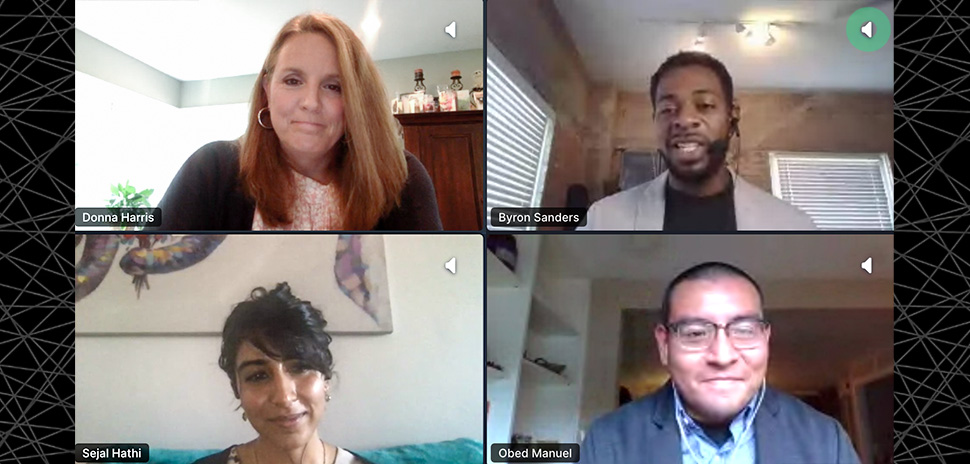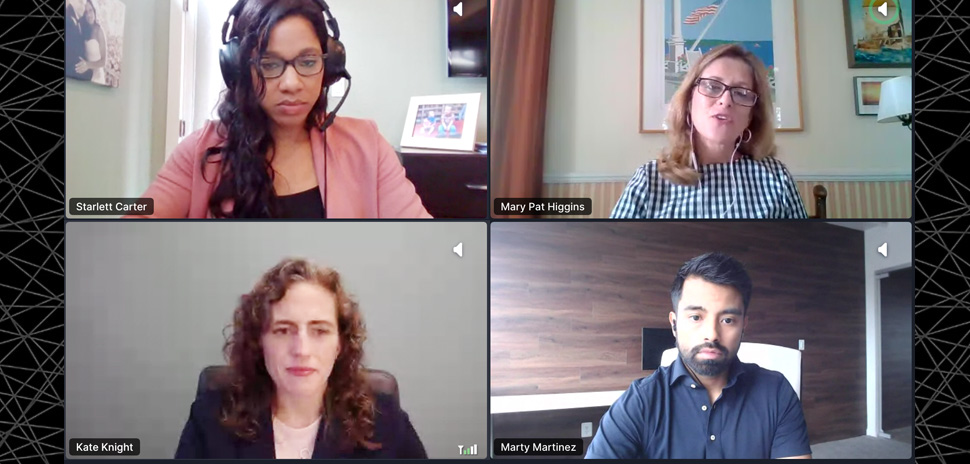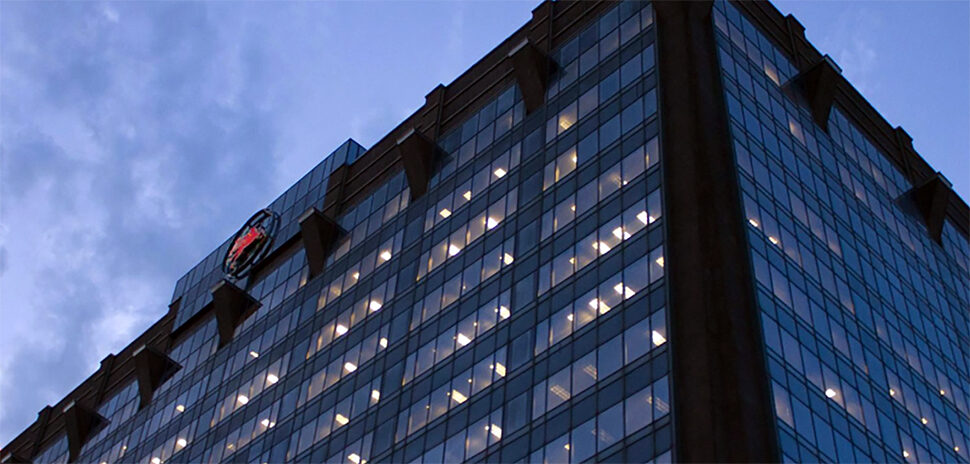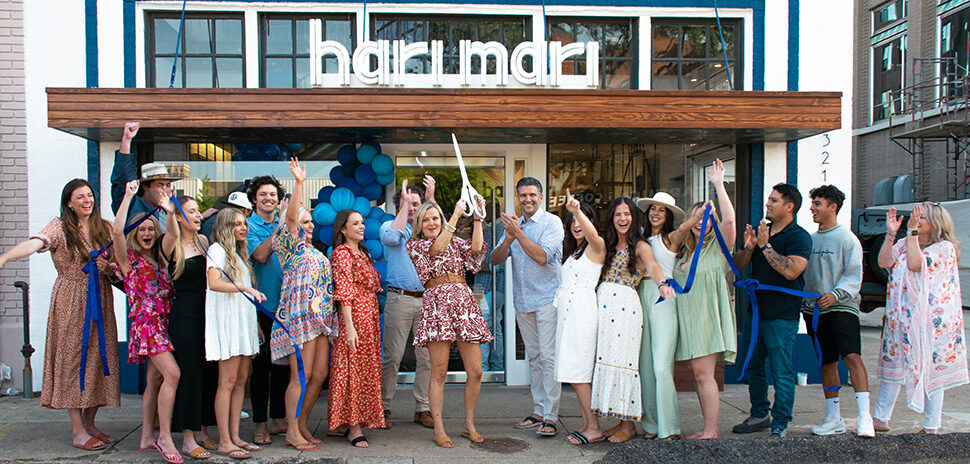Between the COVID-19 pandemic, the social injustice movement, and economic fallout, our world will be forever changed by the happenings of this year.
Dallas Startup Week’s Social Impact Track tackled the question of how this year’s events could lead to meaningful and lasting change. DFW leaders came together to discuss how the extended lockdown caused by the novel coronavirus—which seems to have no end in sight—will have detrimental effects on the economy and society.
Adding to the uncertainty is the death of George Floyd and many other Black Americans at the hands of police officers, which has led to a call for change heard around the world. Issues relating to inequality and civil rights are becoming more apparent than ever.
Combine both and it’s apparent that major things need to happen in the future.
“The COVID-19 pandemic highlights inequities among specific demographics, specifically Black, brown, and those who are socioeconomically disadvantaged,” Star Carter, the co-founder of Kanarys, says. “And, we’ve seen a second pandemic, a racial pandemic, that really has shone through the inflection point of George Floyd.”
Carter, who is also the COO and general counsel of Dallas-based Kanarys, a tech platform that fosters collaboration between companies and employees on DEI in the workplace, recognizes that the murder of George Floyd is “nothing new.”
Some, in fact, weren’t optimistic going into this year. Based on her research, Donna Harris, the founder and CEO of Builders + Backers, which ignites communities across the world with experimentation and entrepreneurial action, saw that the country was “deeply broken.”
“Nobody could have predicted a pandemic, but I’m completely unsurprised at how the pandemic is highlighting what it’s highlighting,” she says. “I’m unsurprised that racial tensions are boiling over. I’m unsurprised that we’re in a moment of bitter partisanship, and I’m unsurprised that the pandemic is having outsized effects on some proportions of our population, some types of companies, and some communities.”
The folks who have suffered most from the pandemic are the ones in Black and brown, poor, or marginalized communities, says Byron Sanders, the president and CEO of Dallas-based Big Thought. Big Thought is a local educational nonprofit that works to close the opportunity gap for youth in marginalized communities.
And, as Harris says, that’s not all that shocking.
But to many leaders, this year’s racial pandemic feels different than past equality movements. Sanders calls it the “confluence of the pandemic”—in addition to the way George Floyd died, national discourse, and the direct aftermath.

[Image: via Dallas Startup Week]
“This feels different,” Carter says. “We have people—no matter what they look like or where they come from—saying, ‘I’m dedicating time and resources to racial justice.’ It doesn’t matter the demographic, people are really wanting to focus on allyship and how to do their part to help.”
For many corporations and startups, these events have led to a push for diversity in the workplace. Many business leaders have made a commitment to DEI (diversity, equity, and inclusion) and establishing an employee base that actually reflects what the world looks like.
Amid the pain, that’s the silver lining, Carter and other experts agree.
“This has been in some sense both more upsetting than I might have anticipated and also promising, if you will,” Dr. Sejal Hathi, host and creator, of Civic Rx, says. “This has forced us to reckon with these questions that we had been shoving beneath our consciousness for decades in the making.”
A spark of opportunity
Marty Martinez, the CEO of Social Revolt, calls this a pivotal point in our history. Social Revolt is a digital marketing agency based in Dallas that has a diverse base of clients across the country.
Martinez echoes Carter that impacting large companies is really going to happen within the ecosystems in which we represent.

[Image: via Dallas Startup Week]
“I think of this as a spark that has the opportunity to be an even larger flame, but the flame really kind of relies on the people. I think it’s up to employees that work at these companies to then stand up and say, ‘Hey, what are we doing within our own organizations?'” he says. “I think this movement can be a catalyst for change, but it’s up to us to take a stand.”
Martinez recently was invited to the global stage at the World Economic Forum to be an advocate for the Hispanic community, a cause he’s incredibly passionate about. In the advocacy world, “change happens at the ground level,” he says—it’s one thing to read headlines about what Fortune 500s are doing, and another to do something yourself.
Though for some journalists writing said headlines, this is a way to be a part of the change.
Much like Martinez, Obed Manuel is a voice for the Hispanic community. As a staff writer at the Dallas Morning News, Manuel covers immigration, news, politics, social justice, and issues affecting second generation Hispanic immigrants in North Texas.
Manuel has always tried to “focus on underserved communities and communities that deserve to be heard.” He says much of what he does has been muddled by the coronavirus, but the tragedies of this year have sparked necessary, transformative actions.
“The conversation of racial justice affects every person of color in this country, some worse than others. This is a very mixed bag of a year,” he says. “As far as what I was hoping for, I was hoping that people would be heard and, I mean, this is why we’re here. People are being heard right now. And you can only hope that it’ll bring some change.”
The definition of inclusion
The events of this year have brought racial injustice to the center of the conversation. But social impact leaders say that total inclusion in the future also means including all types of underrepresented people.
Kate Knight, the “chief MPact officer” at My Possibilities, hopes more opportunities will be extended to people with physical and intellectual disabilities.
A huge part of inclusion in the workplace means all people feel like they’re apart of things, Knight says. That’s the main goal at My Possibilities, a for-cause organization dedicated to providing adults with developmental and intellectual disabilities the chance to live the life they deserve.
“Don’t be afraid of something that’s different and unknown. Don’t make assumptions about how things might work rather than listening and learning,” Knight says. “Some of the accommodations that might be needed for a person with a disability to do their job are simple, little things that are not challenges.”
What’s next
So, will the events of this year lead to meaningful and lasting change?
That’s the biggest question, according to Sanders. The “story is still being written” on what the future will look like. But, he says, “nothing has ever shifted in American society without the voice of young people.”
“Anybody who’s in youth development spaces right now, especially if you’re working with teens, if you’re not addressing these issues, you’re actually behind. Because they’re coming with questions,” Sanders says. “They’re coming with fire, they’re coming with anger. And if you’re not mentally prepared to take that in, and if you try to squelch that voice, you’re gonna have problems.”
To Harris, the “unstoppable group of people” is entrepreneurs. Certainly, she says, institutional solutions are needed, but there’s actually a lot to be done at the ground level in individual communities.
Her idea is to treat a community like a petri dish to run ideas and experiments, roll up our sleeves, and “try some stuff.” There’s no better group of people with the grit to do so than entrepreneurs.
“We find ourselves in this moment where we have a pandemic, we have an economic crisis, we have social unrest, we have political unrest, and we have enormous partisanship,” she says. “The reality is, entrepreneurs aren’t just needed in this moment because we have to save small businesses and we need the jobs that they’re going to create. People who are entrepreneurial thinkers and doers need to be the leaders in this moment.”
These conversations were part of the Social Impact Track at Dallas Startup Week 2020.
Byron Sanders, Donna Harris, and Obed Manuel were on a panel called The Social Impact of 2020, a wide-ranging discussion on how this year has challenged our worldview and what comes next. Dr. Sejal Hathi was the moderator.
Star Carter, Kate Knight, and Marty Martinez were on a panel called Change the Culture: Building a More Diverse Workplace, which was moderated by Mary Pat Higgins, the president and CEO of the Dallas Holocaust and Human Rights Museum.
![]()
Get on the list.
Dallas Innovates, every day.
Sign up to keep your eye on what’s new and next in Dallas-Fort Worth, every day.



























